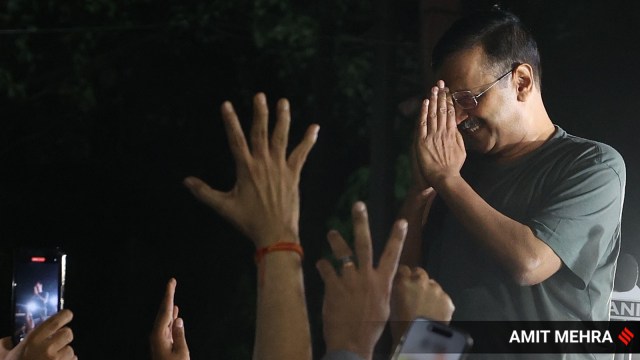Delhi HC suspends Kejriwal bail order for ‘2-3 days’, reserves verdict on ED’s stay plea
The Delhi High Court said that the trial court order granting bail to Delhi Chief Minister Arvind Kejriwal will ‘not be acted upon’ till it hears the Enforcement Directorate’s plea.
 Delhi CM Arvind Kejriwal was arrested by the ED on March 21. (File Photo)
Delhi CM Arvind Kejriwal was arrested by the ED on March 21. (File Photo)The Delhi High Court Friday put on hold for “two-three days” the order of the trial court a day earlier granting bail to AAP leader and Chief Minister Arvind Kejriwal. The High Court said it was reserving its order on the Enforcement Directorate’s plea seeking a stay on the bail order.
This means that Kejriwal, arrested by the ED on March 21 in a money laundering case linked to the Delhi excise policy case being probed separately by the CBI, will continue to remain in Tihar Jail until the High Court pronounces its order.
It also issued notice to Kejriwal on the ED’s main petition challenging the trial court’s Thursday order and listed it for July 10.
The single-judge bench of Justice Sudhir Kumar Jain, who heard the ED prayer and counter-arguments by Kejriwal’s counsel, said, “Arguments are heard. Order is reserved. Till the pronouncement of the order on the stay application, the operation of the impugned (trial court) order is stayed.”
On Thursday, Special Judge Niyay Bindu of Rouse Avenue Court had granted regular bail to Kejriwal and declined the ED’s plea to keep the bail order in abeyance for 48 hours. This prompted the ED to approach the High Court Friday.
The bench said it wants to go through the “entire record, the impugned judgment” and will pronounce its verdict on the stay application in “two-three days”. It permitted both parties to file short, written submissions by June 24.
Seeking stay of the bail order, Additional Solicitor General S V Raju, appearing for the ED, said he was not granted a “full and complete opportunity” in the trial court to canvass his entire arguments and was told multiple times to “cut short” his arguments.
Raju said the bail order was “totally perverse” as it was contrary to the twin mandate of Section 45 of the PMLA.
Firstly, the public prosecutor, he said, has to be given an opportunity to oppose an applicant’s bail plea. Secondly, when opposed, the court while granting bail, he said, should be “satisfied that there are reasonable grounds for believing” that the applicant is not guilty of the offence.
“You have to come to a finding that he is not guilty of the offence, then only you can grant bail. There has been no finding on this. There has to be at least a discussion… It has to be based on material. Here the material has not been considered. There can’t be a better case for cancellation of bail,” Raju said.
“In the impugned order, the court does not hear us. It does not look at the documents given by us and says it is voluminous. It says bulky documents have been filed. You (trial court) say documents filed are irrelevant. Without going through the documents how can it say that it’s irrelevant?” he said.
Raju said this would indicate that the finding is perverse since the trial court has not looked at the documents filed by the ED.
“The trial court admitted that it had not read the papers. A judge who admits that they have not read the papers and are then granting bail? Without reading the papers, you say it’s irrelevant. How can you say it is irrelevant without reading the papers? There can’t be more perversity than this. The order has to go on this finding alone,” he said.
He said the ED traced Rs 45 crore of the proceeds of crime and the way it was used in the Goa election campaign in 2022, yet the trial court finding was that the agency had not shown how it was used.
Kejriwal, he said, is guilty of money laundering in two capacities where he “personally demanded 100 crore” when he was part of the making of the policy and other instances which carved out his individual role.
Secondly, Kejriwal is also vicariously liable, Raju said, as the AAP is also guilty of money laundering. The party, he said, used these funds, which were part of the proceeds of the crime, in the AAP’s election campaign and events. AAP has been made an accused in the case under Section 70 PMLA (in the capacity of a company) and hence Kejriwal, responsible for the party’s affairs, is vicariously liable, he said. This argument had also not been dealt with by the trial court, he said.
Senior Advocate Abhishek Manu Singhvi, appearing for Kejriwal, said there was a “complete misconception” on what a trial court judge dealing with bail application should do.
“The ED’s conception appears to be that the bail hearing, mainly because it involves a Chief Minister and mainly because there is political antagonism with the ruling party, must go on endlessly for hours… must mean that the judge must write an essay, must mean that if the judge does not pinpoint and repeat verbatim comma, full stop of Mr Raju’s argument, then it gives an occasion to Mr Raju to malign the judge.”
“It’s extremely unfortunate the way he has maligned the judge, made direct allegations, made hints and innuendos. Because a judge dealing with bail must not have a healthy, robust commonsensical approach? But unless they write pages and pages which in the ultimate trial will have an effect, Your Lordship should interfere. The whole approach is completely deplorable. It should never come from a government authority. There is complete partisanship (by the ED) in every submission,” he said.
Singhvi said the April 9 verdict of the single-judge bench of the High Court, which had upheld Kejriwal’s arrest by the ED, was taken to the Supreme Court, which is under “active consideration” of the apex court and the order is reserved, and that the apex court has the “last word” on the matter.
He said the law is clear that grant of bail as opposed to cancellation are “two totally different species”. Referring to certain judgments of the Supreme Court on this aspect, Singhvi said “very cogent and overwhelming circumstances are necessary in an order directing cancellation of bail already granted”.
The ED’s charge against Kejriwal is that he was involved in money laundering both directly as CM and vicariously as AAP convenor. The trial court flagged three issues to rebut this: timing of arrest; revisions in approver statements; whether money seized is crime proceeds.
“Generally speaking, the grounds for cancellation generally are interference or attempt to interfere in administration of justice, evasion, abuse of concession granted to accused in any manner. These are the main grounds,” he said.
Singhvi said the High Court may find overwhelming and cogent grounds for cancelling bail while passing the “final judgment”. “However, how does Your Lordship find cogent grounds on an interim stay application?” he said.
He said that there was also no argument by the ED on Kejriwal being a “flight risk” to warrant cancellation of bail.
“Like Alice in Wonderland, the ED has its own understanding of perversity. Every time it is said the trial court did not note that argument or had considered it. The trial court does not need to write an essay. There is no perversity. I may write differently, you may write differently, this is not perversity… A stay in a case like this is nothing but cancellation of bail,” Singhvi said.







